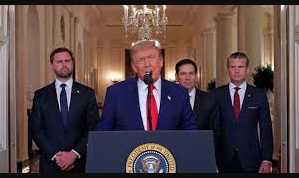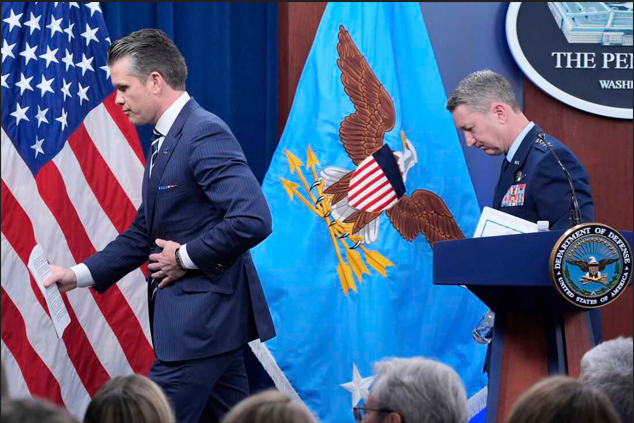
In a shocking and contentious statement, former U.S. President Donald Trump asserted that the United States executed a significant military attack on Iran’s nuclear sites, severely damaging its nuclear program. The message shared on Trump’s social media site “Truth Social” has sparked international concern and heightened anxieties about an expanded conflict in the Middle East.
Although the Biden administration has mostly refrained from comment, intelligence leaks, satellite imagery, and regional reactions indicate that a significant event took place. This work examines the claims, possible realities, and the consequences for the future of the planet.
Trump’s Daring Declaration
On June 22, 2025, Trump published a video message, asserting:
“Iran’s nuclear sites are destroyed.” Due to American power, the world is more secure today. They were mere weeks from constructing a bomb. “Not any longer.”
He cautioned that should Iran try to reconstruct, it would encounter even more severe repercussions. Although Trump is no longer in office, his impact on U.S. politics and discussions of foreign policy continues to be strong.
He remarked that this was the “biggest national security achievement of the century,”
He remarked that this was the “greatest national security achievement of the century,” implying that it was U.S. military personnel, rather than partners like Israel, who executed the operation.

Information Regarding the Supposed Assault
Although the U.S. government has not publicly verified the operation, sources from Israel, defense analyses, and released satellite imagery suggest that multiple significant Iranian nuclear locations were struck, including:
Natanz – a key uranium enrichment facility
Fordow – a secured subterranean site
Arak – location of a substantial water reactor initiative
It is said that B-2 stealth bombers, cyber operations, and bunker-busting weapons were utilized in a synchronized attack. The objective: eliminate Iran’s capacity to enrich uranium over 60% and stop it from attaining weapons-grade standards.
Defense analysts have characterized the attacks as a “pre-emptive strategic operation,” intended to postpone or stop Iran’s nuclear weapons development schedule.
Iran’s Response
Iran has not confirmed or denied the extent of the damage.
A statement from the Islamic Revolutionary Guard Corps (IRGC) promised retaliation, labeling the strike as an “act of war.”
Within a day, Iran allegedly conducted missile strikes on a U.S. base in Qatar and locations in Israel, but there were no reported injuries.
Tehran blamed Washington for intensifying the conflict and indicated that the attack would merely reinforce its determination. “One high-ranking Iranian official stated on state TV, ‘We refuse to let aggression determine our future.’”
International Responses
The global reaction has been varied:
Israel praised the action, calling it “crucial and influential.”
European Union leaders stressed the importance of moderation and advocated for renewed diplomatic efforts.
Russia and China criticized the assault, blaming the U.S.
. with breaching international law.
The United Nations voiced serious worries regarding regional stability and called for prompt de-escalation.
The IAEA has sought permission to evaluate the damage and confirm if Iran’s nuclear program has genuinely been stopped.
Implications for Strategy
Specialists caution that although physical structures may be demolished, scientific understanding and purpose cannot be obliterated. Iran’s nuclear initiative has been in place for many years.Researchers, data, and understanding remain constant
Even more concerning to watchers is the possibility that these assaults could compel Iran to intensify its nuclear aspirations—this time covertly, beyond global scrutiny.
Certain analysts anticipate that Iran may now completely reject the Non-Proliferation Treaty (NPT) and actively pursue nuclear arms as a form of deterrence.
Trump’s Political Perspective
This prominent allegation also carries domestic consequences. Trump continues to be a prominent political figure in the U.S., and his tough position on Iran appeals to many voters. The declaration seems to frame him as a leader who is “tough-on-foreign-policy”—perhaps as a step toward a potential presidential campaign in 2028.
Critics contend that unverified announcements could jeopardize U.S. troops, harm international diplomacy, and provoke unwarranted conflicts.
Final thoughts
Regardless of the complete accuracy of Trump’s assertions, it is evident that a major event has occurred. If Iran’s nuclear sites were actually targeted, the next question is: what’s next?
Will Iran back down or respond?
Will diplomacy endure this setback, or will the area spiral into a larger conflict?
It is evident that the dangers are more significant than ever.
The globe now observes as a perilous phase in U.S.–Iran relations develops, with nuclear tensions, regional conflict, and international security at stake.



l42b4z